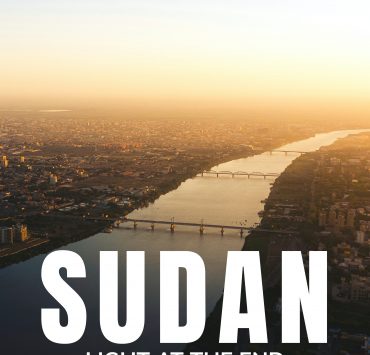Nations and other Religions Pt2

Abel Merawi is from Addis Ababa. He is an English…
A Shift from Nationality to Humanity
How remarkable are children for asking seemingly silly questions that startle adults. Born out of the curiosity and innocence of childhood, they question the abstract world of religion, nationality, or our political and social systems. As adults, we have undergone social acculturation, and so we discard their questions as unfathomable and silly. Personally, I like how children think and use such questions for self-examination. I have conceived nationality as religion by starting in a similar manner, and hope readers will benefit from it as well.
When we religiously idolize our nationality, we become belligerent extremists towards other nations. Throughout history, we have warred in the name of ethnicity, race, nationality, religion, or political ideologies. Yet children fail to understand wars, and try to provide us with the most direct path to reconciliation and peace. The diaries of children who lived through wars attest this view. For instance, in The Diary of a Young Girl, we see Anne Frank believing in the goodness of humanity rather than categorizing humans as Nazis and Jews. Also in Zlata’s Diary: A Child’s Life in Wartime Sarajevo, we see Zlata Filipovic contending that there are good and bad people regardless of nationalities and religions. Then in Left to Tell: Discovering God Amidst the Rwandan Holocaust, we see how Immaculée Ilibagiza characterizes evil as a spirit that can possess any ethnic group, and that universal humanity is the only path to life. If we cite children’s testimony in every war, they will astonish us through their holistic identification of good and evil. How sad it is then that we adults constantly chose segregated death instead of holistic life. Well, our maturity may perhaps just be the internalized maturation of nationality and other religions, making us see the world through parochial lenses.
When religions champion segregated love, they view those outside as evil so as to cover and justify their inhumanity. Nationality, as currently applied, is the religion of separation. The patriotic citizens often remind us of ardent believers; they both view the world through religious lenses. For the nationalist, the world is occupied by national allies and enemies. The nationalist lives in an imaginary land where one’s nation is eternally good, virtuous, and defends this myopic vision against ‘evil’ nations. The nationalist has forgotten that good and evil are part of the human condition, and so invites war by extinguishing the fire of universal humanity.
What is true of individuals remains true of nations. As individuals we have the potential for both good and evil, and so do nations. Moreover, the very fact that nations do not possess the ‘pang of conscience’ as human beings do, adds callousness to the evils of nationalism. Nations are sovereign political entities, and morality is cast off in the process of institutionalization. Politically, nations only respond to laws and conventions. In their maturation, nations evolve into religions governed by provincial morality. In other words, humanity is nationalized while inhumanity is universalized. Alliances can be formed among nations, but they blow and change with the wind since they are based on ‘national interests’ rather than the uniquely human spirit of friendship. The doctrines of nationalism have now distorted our human interaction. Now, precious human beings are raised to treat each other primarily as citizens rather than humans.
We are all born into nations, with a national identity, so it seems only natural. Yet, it is both unnatural and unhealthy. The only concrete identity is of two kinds: collectively, it is of being human and individually, it is the unique personality each of us possess. But when political identity takes precedence over humanity, we hide humans under nationality. Living in an age obsessed with nationality, we confuse human suffering with national suffering. We fight wars, celebrating death of ‘others’ since our delusions make us only see their nationality. The news reports victims of war in Libya, Somalia, Ethiopia, Ukraine, Palestine, etc. In truth, humans are suffering from poverty, natural disaster, or wars all over the world; but to children of nations, suffering has a nationality.
For the sake of humanity, open up your eyes to discover the doctrines of nationalism. Look closer, and you will find a national myth echoing the mighty origin of the nation. Just as every religion claims superiority to others, your nation too mocks the rest by preaching of its unique greatness. It uses history and science in place of the holy books. Then, there are the new preachers – politicians and intellectuals – who explain present reality. These demagogues speak of national greatness to lure you using your pride, and they blame you for national crises to dominate you through a sense of guilt. To keep you in a leash, they then promise you a utopian future that demands your unswerving allegiance.
In the beginning, the nation existed to serve the people. Now, the people exist to serve the nation. If you wonder about the magic spell the national preachers used to make this alteration, you will find the answer in sciences and political ideologies. Our academic books, known as curriculum, have reduced reality to social and natural sciences. The constitution of every nation has reduced individual and social life to a political existence that is guaranteed only through nationality. In these holy national books, you find a thorough explanation of past and present with the promise of and demand for the future.
The new preachers approach the people with the holy books, and define national virtues and evils. First, the elites reverently hold fast to contradicting researches and take center stage. They tell the people how ‘irrational’ and ‘unscientific’ it is to do some things; they then speak with pride about the ‘proven’ and ‘logical’ way to live. The intellects leave the stage for the politicians, but stay close behind them in case they are needed for assistance. The politicians are cheered to the stage by ardent followers. Dressed to command attention, the politicians open their holy book filled with manuscripts of party ideology and speak of the future. They too warn the people to avoid the unpolitical ways of life, and teach citizens of the politically virtuous path to the promised future. The highest national crime is treason, and all institutions cautions citizens to avoid it.
It has become common to find intellects practicing pseudoscience, and politicians whose actions resemble that tribal chiefs. The hatred towards traditional practices is what both have in common. Both science and politics engage in disparaging and denigrating statements; science ridicules traditional medicine, while politics mocks old religions and traditional social structures. Working in alliance, science and politics have managed to make traditional medicine illegal and the healers criminal. They have created a legal language that controls natural movement and industriousness. In this regard, animals are more privileged than the citizen. Freely does a bird build a nest, a fox digs a hole, animals roam through the jungle and fish swim across the sea. But nationalized humans require license or permission for these natural activities and other expressions of freedom!
For the systematic incorporation of the natural into the political, nations use the constitution while science uses the curriculum. Erich Fromm’s work, On Disobedience, explains that there are priests or religious lawmakers, who institutionalize prophetic ideas into rules to create systems. He remarks, “There are priests not only in religions. There are priests in philosophy, and priests in politics. Every philosophical school has its priests.” Truly, every nation too has its politicians or lawmakers, and every science has its elites who dictate the meaning and pursuit of wisdom. These religious elites of politics and science create the constitution and curriculum in order to imprison humans within national borders, and to limit knowledge into certain fields of studies.
The constitution and the curriculum are the new religious books, and they contain practices and rituals. To prove the existence of the nations, many temples have been erected and the people are awestricken when a message comes from this national revered houses of worship. For the supremacy of the scientific, there are the towering learning and research institutions in every form and guise. While politics reigns supreme through the temples that house the top ranking officials, the ministries, and courts, the parliament and all other offices that guarantee political bureaucracy.
Finally, comes the national ritual and sacrifices that contain the powerful chains used to shackle the people. The rituals find expression in flags, anthems, or in the martyrs and heroes who sacrificed themselves for nationality. They are also the permanent rituals of national celebrations, the lifestyle and work ethics that define national identity. Then comes the ultimate duty of citizens, sacrificing oneself and killing others in battle for the nation to prevail. This is the modern sacrifice in which the innocent youths are sacrificed to defend their religion of nationality. As is the case in all cunning religions, the elites and politicians always speak of sacrifice, but they seldom sacrifice themselves. It is usually the dogmatic citizens who sacrifice their lives. The tragedy of such sacrifice is that it is done to protect a futile religion of science that limits knowledge, and to defend the parochialism of nationality that diminishes humanity.
The underlying problem seems to be institutionalization in religious doctrines and dogmatism in the religious followers. With Rollo May, we must realize that “freedom is release from dogma.” Spirituality, on the other hand, is the majestic realization that begins in the individual and embraces the whole of humanity, including the cosmos. But modern humans have become half-dead, departing from the spiritual side. As Erich Fromm contends, the physically alive and the spiritually dead is ‘not only subject to decay but becomes dangerous – dangerous to oneself and others.” Truly, we are perpetuating decadence, and we have become catastrophic to ourselves and others. The return to spirituality informed by humanity may perhaps deliver us from religions of segregation and help us follow the path to individual and collective redemption.
When we view existence by clearing the mist created by centuries of falsehoods, we find humanism and the shared fundamental sameness of human. Humanism is the creation or origin story of every religion that beings with a single person. Science has kept the origin story and only altered the progression. Be it the big-bang theory, atomist Theory, or even the story of evolution, the story begins with a single human or single group that spread and engulfed the world. This truly makes the story and religion of nationalism laughable, if not a cause of contempt. Above all, it should be a reason to change our ways.
Embracing humanity does not require the eradication of religion, nations and science. Humanity is the prophetic religion that appeals to the humanistic elements in all religions. It is the celebration of nations as diverse expressions of life that flourish through humanistic relations with one another. Humanity is also the utilization of science in combination with traditional practices so as to achieve genuinely humanistic progress. However, afflicted by nationalism, every nation currently suffers from egomania and tyrannically strives to remake the rest of the world in the image of a single nation. For this very reason, the religion of nationalism deprives the world of the essential diversities that add meaning to the world. Diversity, as explained hereunder, means different perspectives that add meaningful choices to life. Nationality destroys it by equating diversity with enmity, or by arrogantly forcing other nations to resemble a single nation.
Diversity in worldviews must bring nations and religions together in the spirit of universal humanity. The political theorist, Hannah Arendt, in The Human Condition, reminds us that our diversity must not neglect the sameness of the world, stating, “Only where things can be seen by many in a variety of aspects without changing their identity, so that those who are gathered around them know they see sameness in utter diversity, can worldly reality truly and reliably appear.” Thus, we can celebrate our diversity in societal structures, cultures or traditions if we remember that they are all interpretations of the same world, and of the shared humanity we all possess.
The foundation of universality, above all, highly depends on the realization that the world belongs to past, present and future generations. Hannah Arendt, calls it ‘the common world’ and beautifully expresses it in words that resonate across generations, “The common world is what we enter when we are born and what we leave behind when we die. It transcends our lifespan into past and future alike; it was there before we came and will outlast our brief sojourn in it. It is what we have in common not only with those who live with us, but also with those who were here before and with those who will come after us.” This words speak the ancient African wisdom of Ubuntu, it is in the Buddhist doctrine of Zen, it echoes from Islam and Christian traditions that inherited the humanistic elements of Judo-Christianity.
Humanism is not a new concept; it has been with us for centuries. Ancient civilizations, understood life collectively as a progress from past, to present, towards the future. I conclude with the idea of Ubuntu as it is the one I intimately know. But I wish a discussion follows that can enrich our understanding from diverse cultures all over the world that embody humanity. The African concept of Ubuntu is a philosophy of life as it recognizes existence in its entirety. Ubuntu is a statement about life rather than an argument. It is a factual statement because it considers the individual and the present generation as part of a continuum from past to future. Ubuntu is concerned with humanity, and is conscious of the health relationship of humans and nature. Nationalism has gathered strength for centuries, making it hard to envision life without it. However, it is no match to the rich tradition and the spirit of life that humanism embodies. Through nations, we can live a tribal life by imagining we are the center of the world. But there is a better, human way to live. The earth is all we have and help is not coming, so we only have each other.
You can read part one of this article here.
What's Your Reaction?
Abel Merawi is from Addis Ababa. He is an English literature teacher, freelance writer/reporter for Ezega.com and an Amharic-English translator and editor. He also writes for www.msingiafrikamagazine.com. You can reach him via: abelmerawi4@gmail.com


















